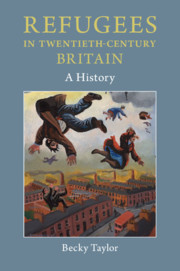Book contents
- Refugees in Twentieth-Century Britain
- Refugees in Twentieth-Century Britain
- Copyright page
- Dedication
- Contents
- Acknowledgements
- List of Abbreviations
- Introduction
- 1 Protectionism vs Internationalism
- 2 Post-War Settlement
- 3 Rivers of Blood
- 4 Marketisation and Multiculturalism
- 5 A New World Order
- Bibliography
- Index
2 - Post-War Settlement
The Hungarians
Published online by Cambridge University Press: 23 April 2021
- Refugees in Twentieth-Century Britain
- Refugees in Twentieth-Century Britain
- Copyright page
- Dedication
- Contents
- Acknowledgements
- List of Abbreviations
- Introduction
- 1 Protectionism vs Internationalism
- 2 Post-War Settlement
- 3 Rivers of Blood
- 4 Marketisation and Multiculturalism
- 5 A New World Order
- Bibliography
- Index
Summary
History seemed to be on the side of Hungarian refugees arriving in Britain in the winter of 1956–1957. Public sympathy for these ‘heroes’ who had stood up to Soviet oppression chimed with wider Cold War politics, while an expanding economy in need of workers seemed to ensure that they would settle quickly into British society. But if Britain’s enthusiastic welcome of the Hungarians – supported by a mammoth voluntary effort – seemed to show it as a self-confident nation, cracks rapidly began to show. The Suez crisis had revealed Britain’s waning power, a trend reflected in many Hungarian refugees’ desire to move on to America or Canada. Refugees’ lack of ‘gratitude’ was to come up time and again as volunteers, camp workers and the public found Hungarians uncooperative and demanding. Resonating with contemporary fears over generational conflict, once ‘resettled’, wayward behaviour by young male refugees saw them labelled ‘juvenile delinquents’ or ‘Central European teddy boys’. Where their foreignness intersected with local concerns with competition over work or local ‘girls’, xenophobia spilled over into hostility and violence. This was in many ways a foretaste the 1958 Notting Hill riots, and demonstrated that beneath a veneer of British self-confidence, many Britons were experiencing profound disquiet at the ways in which the country was changing.
- Type
- Chapter
- Information
- Refugees in Twentieth-Century BritainA History, pp. 92 - 148Publisher: Cambridge University PressPrint publication year: 2021

